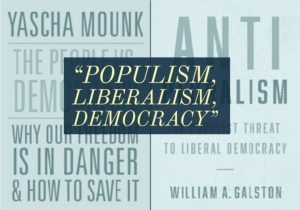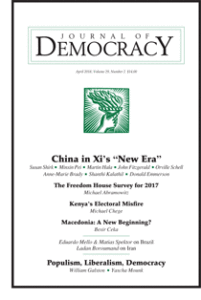Populists can come in all kinds of ideological flavors, notes Yascha Mounk. What they all have in common is an opposition to the pluralism that is inherent to any functioning representative democracy: By claiming that they, and they alone, stand for the people, populist leaders around the world delegitimize any institution that might provide a check on their power.
In that sense, British Premier Boris Johnson’s decision to “prorogue,” or temporarily suspend, parliament has lastingly defined his character, he writes for The Atlantic:
Britain’s political system remains too deeply entrenched to be destroyed by one man or even one political crisis. Despite his evident disdain for parliamentary democracy, Johnson is neither able nor willing to go as far as populists such as Turkey’s Recep Tayyip Erdoğan or Venezuela’s Nicolas Máduro, who have jailed scores of their critics, and abolished free and fair elections. Johnson’s critics evidently remain free to denounce him in the press, and Parliament will be able to resume its job when it reconvenes in October.
 Scott Lucas, a professor of international politics at the University of Birmingham, said Johnson’s maneuver touched off the biggest crisis since the abdication of King Edward VIII to marry the divorced American socialite, Wallis Simpson.
Scott Lucas, a professor of international politics at the University of Birmingham, said Johnson’s maneuver touched off the biggest crisis since the abdication of King Edward VIII to marry the divorced American socialite, Wallis Simpson.
“This is biggest constitutional crisis since the 1930s,” Lucas said. “Even World War II didn’t present a constitutional crisis because the coalition government and Parliament agreed the rules of the game.”
The plan to prorogue parliament is a nakedly populist move that Johnson hopes will lead to a parliamentary majority, adds analyst Tom Kibasi.
Parliamentary sovereignty was one of the soundtracks of the Leave campaign, notes Schona Jolly, QC, a human rights and equalities lawyer. Some might recall that May’s 2017 Brexit White Paper actually admitted that “Parliament ha[d] remained sovereign throughout our membership of the EU,” but that “it has not always felt like that.” But Johnson’s government now aims to dispense even with the pretense that it values the scrutiny provided by parliamentary democracy, she writes for Prospect.
Divided on many politics besides Brexit, and at odds over Labour Party leader Jeremy Corbyn, the opposition may not be able to organize quickly enough, The Times adds.
 “His great advantage is that although his opponents are agreed on wanting to stop him, they can’t agree on anything else, and any dramatic, unexpected move which confuses them is likely to divide them for the same reason,” said Rob Ford, a professor of politics at the University of Manchester. “They’ll come to different conclusions about what’s going on and what to do about it.”
“His great advantage is that although his opponents are agreed on wanting to stop him, they can’t agree on anything else, and any dramatic, unexpected move which confuses them is likely to divide them for the same reason,” said Rob Ford, a professor of politics at the University of Manchester. “They’ll come to different conclusions about what’s going on and what to do about it.”
But while it would be a huge exaggeration to say that Johnson’s attack on Britain’s unwritten constitution spells the death of parliamentary democracy, adds Mounk [a contributor to the NED’s Journal of Democracy], it is equally futile to deny that he is trying to stop the country’s democratic institutions from shaping a decision of enormous importance.







